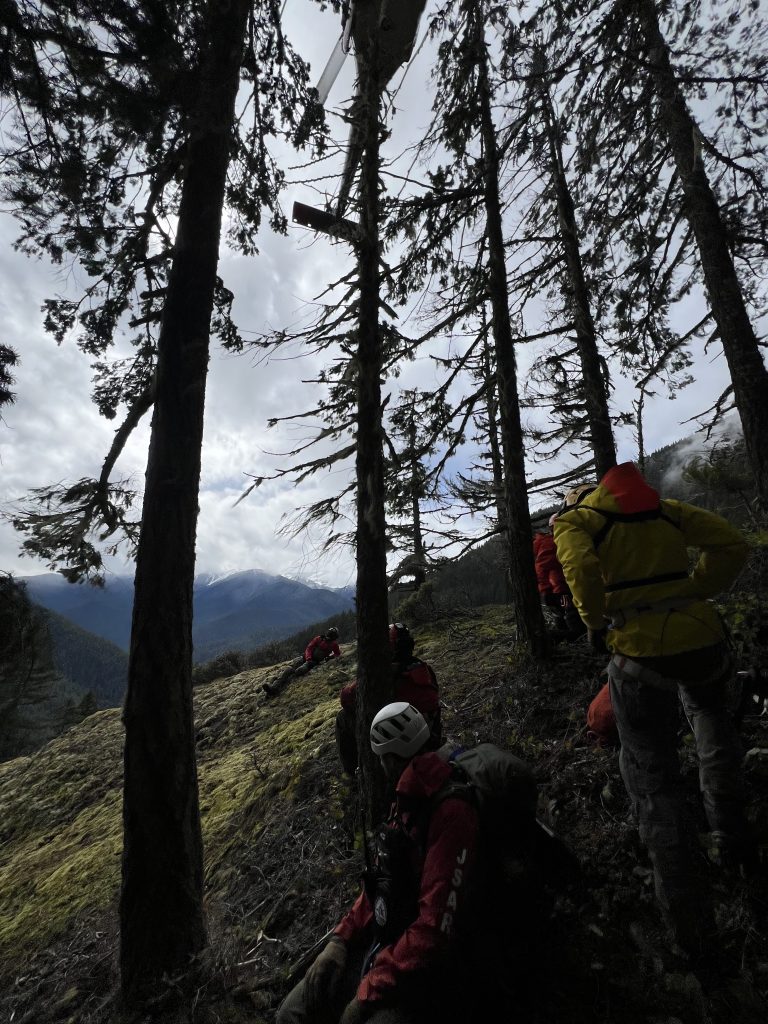The volunteers of Jefferson Search and Rescue are dedicated to search and rescue as well as public education. Together, we spend hundreds of hours per year on SAR operations and training- it is a lot of rewarding work. We are always grateful for new members with an attitude for teamwork and willingness to contribute their experience and time to the team.
See answers to common questions below, see the Application and Training page to find the paperwork to get started, and make plans to visit a JSAR meeting.
What Does a JSAR Volunteer Do?
JSAR members may be searching for lost subjects in the backcountry one day and evacuating a hiker with a lower leg injury down a trail the next. Our calls include front-country evidence searches, downed aircraft searches, swiftwater rescue and technical rescue of injured climbers in remote areas.
What Can I Contribute?
The skills that are the most sought-after in our new teammates are situational awareness, good communication, critical thinking and compassion. Physical fitness, emergency medical experience and knowledge of the Olympic Mountains are secondary.
Climbing, mountaineering, hunting, backpacking, backcountry skiing or whitewater paddling experience is a plus but is not required. Mechanical skills, experience working in and around helicopters and the ability to operate off-road vehicles/chainsaws is also a plus.
Nobody is required to fill every role on the team. People with logistical skills can fill roles that don’t require being on ground teams. Ground crews need support including training, non-profit management, fundraising, outreach, incident management, radio communications, GIS mapping and facilities maintenance.
Climbing, mountaineering, hunting, backpacking, backcountry skiing or whitewater paddling experience is a plus but is not required. Mechanical skills, experience working in and around helicopters and the ability to operate off-road vehicles/chainsaws is also a plus.
Nobody is required to fill every role on the team. People with logistical skills can fill roles that don’t require being on ground teams. Ground crews need support including training, non-profit management, fundraising, outreach, incident management, radio communications, GIS mapping and facilities maintenance.
What Does It Cost to Participate?
The purchase of search and rescue specific equipment is not required and most members operate with the same equipment they normally use to be in the outdoors. Radios, satellite messengers and first aid supplies are supplied by the team during missions.
In most cases volunteers provide their own transportation to missions as this expedites our response time. Members are not reimbursed for mileage when operating in county.
Specialized training is offered at no cost (for all regularly scheduled trainings) or low cost (for some advance trainings) to members. As Washington State emergency workers when on training and actual missions, JSAR volunteers are covered by the state against loss and injury (see WAC 118-04 for details).
In most cases volunteers provide their own transportation to missions as this expedites our response time. Members are not reimbursed for mileage when operating in county.
Specialized training is offered at no cost (for all regularly scheduled trainings) or low cost (for some advance trainings) to members. As Washington State emergency workers when on training and actual missions, JSAR volunteers are covered by the state against loss and injury (see WAC 118-04 for details).
How Do I Volunteer?
We encourage prospective volunteers to visit a couple of our meetings first. Get to know the current members, find out what we do and see where you can plug in. You can visit these meetings any time of year, and all age ranges (14 and older) and ability levels are welcome. Meetings are held the second Thursday of each month beginning at 7 PM at our headquarters hosted by Discovery Bay Volunteer Fire and Rescue adjacent to their station 5-1.
What Happens When I Volunteer?
The Training Requirements page lists an overview of what happens next. Those interested in applying to be a volunteer must submit an application and related paperwork and pass a background check. Next, prospective volunteers must complete online FEMA courses and pass a multiple-choice test on the roles and responsibilities of emergency workers.
JSAR’s annual training for new volunteers takes place during monthly meetings in the spring and culminates in a two-day field exercise. After completion of these basic training requirements, volunteers are added to the call-out roster.
JSAR’s annual training for new volunteers takes place during monthly meetings in the spring and culminates in a two-day field exercise. After completion of these basic training requirements, volunteers are added to the call-out roster.
How Much Time/Training Is Required?
Monthly meetings consist of an operations debrief, a training segment and administrative discussion- this usually takes about two hours. Typically, field training occurs monthly on the Saturday following our meeting. Additional training opportunities are offered outside the regular schedule. See the Training Requirements page to see a list of some optional opportunities for further training.
How Often Will I Have to Respond?
We receive fifteen to thirty calls per year. We currently use a service called Active911 to manage notifications and responses. Participation in any mission is up to the discretion of the member.
When Do I Formally Join the Organization?
Formal voting membership in the non-profit entity that is JSAR is separate from becoming an active volunteer but comes with steady participation in training in accordance with our by-laws, generally after a year of dedicated involvement.

